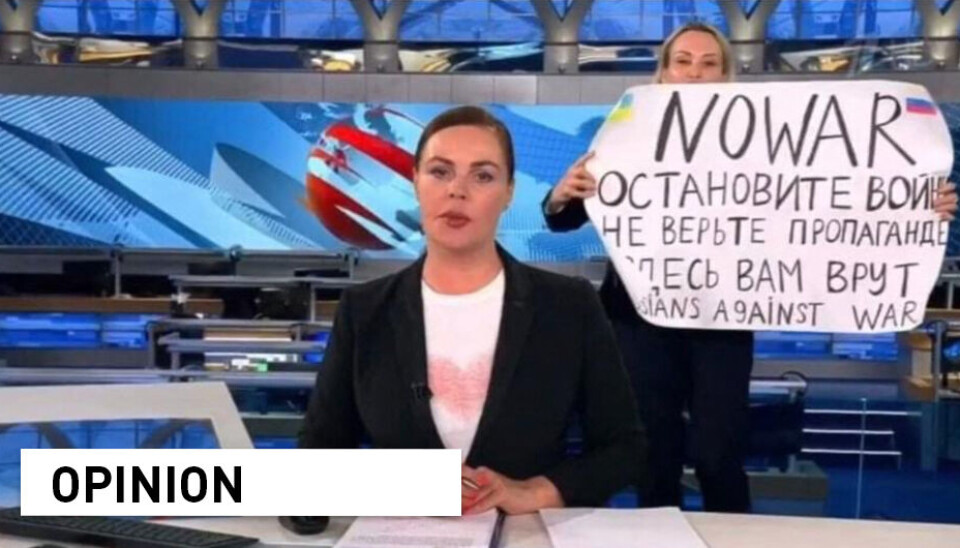Opinion:

For the first time, Russia has lost the information war
OPINION: Russia’s federal government has blocked or forced offline virtually every remaining independent news outlet in the country. Journalism as we normally know it hardly exists in Russia anymore.
In 2008, when Russia invaded a small neighboring republic of Georgia, before defeating Georgian military forces by shelling and bombing peaceful towns and villages, Russians first won the information war. This has become known as the first example of full-scale hybrid warfare using “a coordinated cyberspace domain attack synchronized with major combat actions in the other warfighting domains” – the land, air, and the sea.
Russia's propaganda channels
Since then, Russia has intensified its information and disinformation wars. Russia Today (RT), a state-funded propaganda TV channel managed to aberrate the discourse in the west about the 2008 war, portraying Georgia as an aggressor country.
In 2014, the year Russia occupied the Ukrainian peninsula Crimea, another major propaganda channel, Sputnik was launched by the Russian government. Then there was the 2016 US presidential election and Russians attempting to influence western politics via information manipulation, Brexit, the Catalan crisis in Spain, stories about the Russian Troll Factory, and so on.
The list of Russian deeds within the global informational ecosystem, a phenomenon called “computational propaganda, “network propaganda” or “information disorder”, does not have an endpoint.
Russia will choke on Ukraine
If Georgia was an easy pill to swallow in 2008, it seems that Russia will choke on Ukraine. After almost a two-week-long war, it is apparent that for the first time Russia has lost the information war. Not just with Ukrainians but with the rest of the West, at least.
Soon after the Russian invasion of Ukraine, EU banned the broadcasting activities of RT and Sputnik. While the media sanctions are understandable and highly well-intended, they have also been criticized. Several media organizations, including the International Press Institute, Association of Norwegian Editors, and several Danish media organizations have criticized the EU´s ban based on restricting freedom of speech, justifying reciprocal measures by Russia to restrict foreign media operating within the country and removing insight into how Russian media report about the war.
From international to national propaganda
On the demise of its international propaganda, Russia has intensified the informational warfare against its own people within its own borders.
The restrictions imposed on media production and the information flow within the country is at the scale last seen during the Soviet period.
This is how Russia is strangling information
The restrictions include, but are not limited to:
- The governmental body for supervision in the sphere of communications, information technologies, and mass media (Roskomnadzor) has forbidden Russian media entities to use the word “war” forcing journalists to use the term “special operation” instead.
- On March 4th, the Parliament of Russia passed a bill threatening to imprison anyone from 3 to 15 years if they spread “fake news” about Russian military activities. Any information not coming from the Russian government can be interpreted as “fake news”.
- Due to the newly adopted bill, various western media outlets had to call out their personnel, including CNN, CBS, Norwegian NRK, and Swedish SVT.
- Online outlet Znak decided to close, removing all of their content from the website “due to a large number of restrictions that have recently appeared for the work of the media in Russia”.
- One of the top radio stations, more or less independent Ekho Moskvy suspended operating due to the aforementioned bill and the growing pressure from the government. The station said in a statement that it would delete all corporate social media accounts and turn off its website and YouTube channel as part of a “liquidation” process. Funny enough, the radio frequency used by Ekho Moskvy will be used by Sputnik.
- Independent TV station Dozdh (TV Rain) ceased broadcasting and most of the journalists had to leave the country due to the personal threats they have been receiving online.
- Russia’s last major independent newspaper, Novaya Gazeta, said it was deleting its content about the war in Ukraine.
- The Village, a digital lifestyle magazine that moved its operations from Russia to Poland this week, said it was retroactively editing its articles to change any mention of the word “war” to “special operation.”
- Here is the incomprehensive list of the media organizations either blocked by the Russian government or forced to quit operating: ТВ-2, Tayga.info, The New Times, Doxa, The Village, Zasekin.ru, Protocol, Golos-kubani.ru, Mediazone, “7×7”, Republic and so on.
- Russia has cut public access to Facebook and restricted the use of Twitter.
- The Russian government has blocked major media outlets, including the BBC, The US-funded Voice of America and Radio Free Europe/Radio Liberty, German public broadcaster Deutsche Welle, Latvia-based independent Russian outlet Meduza.
Truth as a crime
This list is neither comprehensive nor static. The level of censorship in Russian media and the information landscape already seems irreversible. More and more media bodies will have to commit crimes by speaking the truth or face punishment for the same reason.
On the one hand, no one can be surprised by the appalling decisions made within the labyrinths of the Kremlin. On the other hand, it is still difficult not to be surprised by the ambition of the Russian government hoping to indefinitely restrict the information in the age of networked societies, smartphones, and mass digitalization.
History has proven that people always find ways to communicate, even in such autocratic countries as the USSR. Russian authorities can simply read about it from their own history on Wikipedia (unless they have already blocked Wikipedia too).
Share your science or have an opinion in the Researchers' zone
The ScienceNorway Researchers' zone consists of opinions, blogs and popular science pieces written by researchers and scientists from or based in Norway. Want to contribute? Send us an email!





























